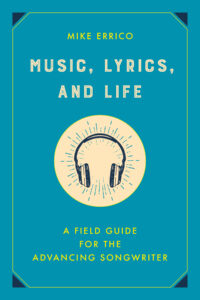I teach songwriting, but when I want to talk with students about the process they’re engaged in, I turn to prose writers for help. I find that they’re just better at “writing about writing” than most musicians are, which maybe shouldn’t be a shocker: writing is what writers do. But when I’m really lucky, I’ll find someone who can speak in both languages.
While researching my book, Music, Lyrics, and Life, I got to speak with George Saunders, who wrestled with songwriting before finding his stride in the short story form. Saunders described both his inability to write songs that lived up to his standards, and his larger struggle to find a form that matched his artistic ambitions. The advice he gave applies to people working in any discipline.
*
Mike Errico: You were almost a professional musician . . .
George Saunders: I was kind of a low-level professional musician for a while, and I still play. It was my first artistic love, for sure. But I’m not much of a songwriter, as it turns out, which was a big deal to realize. Whatever distinguishes a good songwriter from a so-so one, I didn’t have that. It has something to do with the severity of taste.
ME: What do you look for in a song that you weren’t able to provide?
GS: I think it’s probably personality. That’s actually the big one. In my songs, the first verse is, “I love you so much. You’re so beautiful.” The second verse is, uh, the same, basically. Or it’s the obvious next logical development, and the flavor of response, as I do it, feels reductive. With good songwriters, A and B have such a weird relationship, and that’s what makes the brilliance. You are soundly in “A,” expecting certain things, and then “B” comes along and is neither too neat nor too out of relation with “A.”
ME: It seems odd. I’m just thinking about “story songs,” and I feel like you could really nail that.
GS: Here’s the thing: I think in all art, the fatal moment is when you’re creating something and the reader or listener becomes aware of your agenda. I think the essential thing is honesty—what we might call “compositional honesty.” How open are you to changing your plan, in response to what’s actually, and maybe inadvertently, happening within the work in progress? If I’m writing a story and I “know” the ending and am holding that ending back to, like, spring it on you, that’s dishonest—I’m prohibiting the story from responding to its own energy.
If the story decides it wants to go somewhere else, I’m not letting it, which leads to little moments of falseness within the narrative. So, for me, the whole thing is picking that apart and saying, “Well, why is it that, when I got to page three, I just checked out?” Or, “Why is it that, on the third repetition of the intro material, I started feeling condescended to just a tiny bit?” It’s important for an artist to think about this because the listener can turn off the song. A reader can throw the book across the room.
ME: That may be one of the reasons why songs have gotten shorter: Simply by having gotten to the end, you think it’s a better song than it was.
GS: That makes sense. I think a song should go on for only as long as it is truly reacting to itself originally. It should be exactly as long as it needs to be, like what Lincoln said about his legs.
ME: I often quote something you said about the definition of art: “What’s important is that something undeniable and nontrivial happens between entry and exit.” Can you expand on that?
GS: Early in the process of making a work of art, we tend to have a plan. You’re in control of the story, you know where it’s going, you know the effect it’s going to have, and you proceed. You start applying your taste, line by line. You’re cutting or tightening sentences you can’t live with. It’s almost like if you’re driving a car blindfolded but you can feel the wheel will let you turn in one direction and won’t let you turn in others. So you just . . . go that way. And then comes a magical moment where you find that you’ve written (or edited) yourself out beyond that original plan.
So you don’t know what it is the story is supposed to be doing. And that’s a great moment. You just want it to do something, and something nontrivial, but you don’t have to know exactly what that is. When I first started writing stories that were good, I noticed that I came out of them going, “What the fuck is that? I don’t even know what I just did.” Because all I was trying to do is make sure that the energy didn’t drop during it. But then the really beautiful thing that happened was that those stories meant a lot more than the other ones where I was planning everything.
ME: Mike Tyson once said, “Everybody has a plan until they get punched in the mouth.”
GS: That’s amazing. A story will definitely punch you in the mouth. The really interesting thing is, can you truly not have a plan? I don’t think so. But then the process becomes: How do you continually undercut the plan? Identify it and then move beyond it? Or, you sense a plan—a shape, a theme, an embedded idea. Do you stand behind that or not? If you don’t, you make an adjustment.
And, at the end, because you’ve never been dishonest and you’ve never let in a banal or needlessly repetitive line and you’ve never twisted the logic out of its natural shape, your story will spit the reader out on the other end, and she will feel she’s been taken on a ride, from where she was before to where she is now. And only then can she kind of go, “What was it that I just went through?”
Excitement is another thing that is so underrated as a state while producing. Now, it’s tricky—being excited about what you’re writing doesn’t guarantee that what you’re writing is any good. But I think if you’re not in that state, it probably presages failure.
ME: You said something about success: “I try not to be full of shit.” I thought that was sound advice.
GS: What I mean by that is, there’s a sort of systemic falseness in each of us. Revising is having a chance to see evidence of that on the page and then to fix it. So, the place to be not full of shit is while revising. When I was young and single and we didn’t have any kids, I was sort of into the whole idea of having a “persona.” I’d just come from Texas to Syracuse, so I had a little bit of an obsession with the West, and Kerouac, and all of that. Given who my heroes were, I kind of thought, “I should probably be a bit of a wild guy.” But if you have to think that, you’re probably not authentically wild. Let’s not get confused: I mean, James Joyce was not a pirate. He was James Joyce, and he was James Joyce because he sat at his desk for many, many years.
One of my stated goals was to get the world’s attention. And one of the big breakthroughs I had was, I suddenly realized it was okay to freakify your work a little bit in order to get noticed. What I mean by “freakify” is maybe just “urge the story in the direction of originality.” So, if you’re writing and it sounds a lot like a song by the band you like, that’s a problem, maybe. Could you freakify it in some way, to make it not sound like them? Or, ideally, like no one else?
Because one, it’s going to get you more attention, probably, because it’s original, and two, what I found was that the method by which you freakify something is always about you—about your essential artistic urge, your innate taste. Beyoncé’s successful because she’s really interesting. That’s really weird shit that she ends up doing, on Lemonade, for example. Everything in it seems to have been radically chosen by her. So . . . if you want to be noticed, try to be noticed. How are you going to be noticed? By being noticeable. Which means: by being more like yourself. And that becomes a technical process—of continually choosing.
ME: Knowing that songwriting was your first artistic love, how did you decide that prose was the better medium for you?
GS: The kind of big principle that I believe in is that, let’s say there’s twenty things that you do in your life—just general categories of things that you do. We might think we want to be Thing Six. But if we’re doing twenty things, and Thing Eighteen is the one that really lights us up, it’s a real moment of maturation to say, “My time here is short—what can I do the most beautifully?” I think that’s a lesson in prose, but also in life. If you think you’re a com- poser of string quartets, and when you play your string quartets, everybody goes to sleep, and in consolation you pick up your accordion and start playing a polka and everybody dances, well [laughs], there you go. There it is.
ME: And to what degree do you think we make that choice?
GS: I think zero.
ME: Zero?
GS: I think.
ME: Agreed.
__________________________

Excerpted from Music, Lyrics, and Life: A Field Guide for the Advancing Songwriter by Mike Errico. Used with permission of the publisher, Backbeat. Copyright 2021 by Mike Errico.
